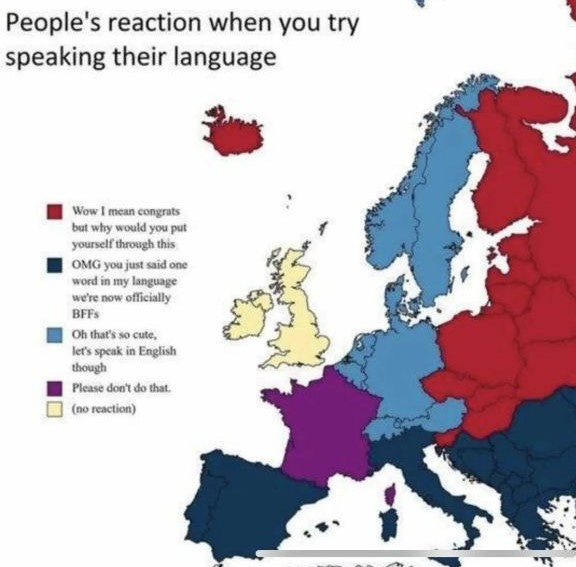Yesterday a question showed up in my Notes feed that felt a relatable concern:
While I certainly find this debate as such interesting and am ever curious about the “natives“‘ replies, I can’t help but feel that this is a rather unhelpful approach to the accent issue.
Before I get into my long answer as to why I think it’s the wrong question, let me establish my Foreign Language Credentials. I am a native Russian speaker. I started learning English back in my kindergarten years; in school I was always top of the class to the point of attending city and regional competitions; then, when I started on my anglophone literature undergrad, I realized how low my level actually was. Since then it is English I am mostly exposed to, and so my level of proficiency should be around C1. In my teenage years I also shortly studied Spanish and started dabbling in German, to which I’m trying to return now with my A-level usage but with my understanding leaning towards B1. I’ve been living in Czech republic for over a decade now, but shamefully my proficiency level is still lacking, solid B1, I’d say (I blame my huge bias towards the use of English). I also studied some Irish Gaelic and Hungarian; the former being my worst foreign language experience; the latter made me wanna have more but currently I can only read texts aloud without understanding 99% of it. Thanks to both Czech and generally my location, I also understand some spoken and written Slovak; I can also understand Ukrainian and Belorussian, and even some Polish if I try really hard and I can reread or relisten to the text.
Oof. So, now to the accents.
In the languages I can actually speak in — English, Czech, and to a much lesser extent German — I do have an accent but it is not your typical Russian one but that hard-to-place one. An Irish friend of my boyfriend’s, upon our first meeting, placed me as a Danish person taught by a Scottish teacher. That was about the closest I got to the British Isles :D
I would be lying if I said I don’t feel flattered at all by having this non-obvious accent. I like the mystery. I also like the cover it provides: I did on a few occasions not acknowledge my Russianness to another person who spoke in foreign language to me but, by their accent, were clearly a Russian-speaker. My name and appearance , I guess, additionally allow me to not be immediately placed. Daria is a fairly common Serbian name. My face is obviously of mixed Slavic/Eastern European (am unwilling to ignore Hungarians here) origin, but that’s still a lot of countries.
I mean, have you also ever experienced that, when you’re in a foreign country, how uncannily easy it is to spot people from your culture?! I can tell a person is Russian(-speaking) without hearing them, and when my boyfriend asks how I know, I can’t answer him. I don’t know. It’s everything. The clothes. The hair-do. The face and its mimics. Body dynamics, too, maybe? You just can spot them. And I bet it applies no to just my fellows.
And here we get to the first part of why I think the ‘Should you drop your accent?‘ is a wrong question. Because unless you also drop your entire background, you’re still going to signal foreignness. Of course, some might see it as fresh and cool about you and your personality. But I can’t help but wonder if for some it would create some sort of uncanny valley effect.
And speaking of which, I’m so not going to try mimic British appearance. Maybe my impression is wrong, but from what I’ve seen and read about how people over there are still crazy about class signifiers and how it seeps into fashion choices, I can only cringe. Over my dead body will I be dressed in a long small-floral-patterned dress, thank you very much.
But an even more important factor in the whole accent thing is that not everyone can bloody drop it. It’s not a ball. It’s your brain wiring and your speech apparatus. Your grammar and vocab can be superb but your phonetics might be ‘lacking‘, forever. No amount of tests and flashcards will help in that case.
So, to elaborate a bit, based on my observations, thought, and the little knowledge of phonetics I’ve retained. You can split the problem in two: pronunciation of individual sounds and of entire sentences. As an example of the first, think of the English sounds for the “th“ letter combination. Germans don’t have it, and so the “z“ sound creeps in instead (interestingly, Czechs would lean more towards “d“). Or the “r“ family of sounds, where each language seems to have their own twist on it, and so Germans struggle with the word “squirrel“ and everyone struggles with the Czech “ř“ (and by everyone I mean Czechs themselves, too: it’s quite common for kids to see a speech specialist here due to this buddy). Don’t even get me started on the vowels.
As to the entire sentences, I’m taking about intonation, with the most obvious differences showing in questions: does the voice go up or down at the end? In German, it depends on the type of question, for example. In Hungarian yes/no question, it should rise till the second-to-last syllable, at which point it falls down. Add to that the cadence, how you go through longer sentences, etc. And mind you, it might as well vary within one language: individual sound differences aside, would you mix a person from, say, English Newcastle with a person from New York? I doubt that.
The problem is, that this aspect of the language is extremely tricky to both teach and learn, if we aren’t talking about early and continuous exposure to a given accent. The older you get, the trickier it is. I have a colleague in her sixties who has recently started studying English, and she mentioned how she sometimes just doesn’t hear sounds. I deeply regret not asking her further because I’d like to try to imagine this experience, but I also think that however much I try, I wouldn’t be able to. I personally happen to hear sound differences pretty well. Maybe it has something to do with the variety of languages I exposed myself to as a youngster, which helped my brain develop those “hearing“ parts of it well, or maybe I’m just formed that way. And thanks to the phonetics course at the uni I’m aware of some mechanics of it, and so when I hear an interesting way someone says something, I try to “place“ it in my mouth. Because that’s what it ultimately is about: an individual sound is a burst of air passing through a particular chain of obstacles formed by your throat, teeth, lips, and, of course, your tongue. But I have also realized and accepted the fact that some sounds are closed off for me already, mostly those more throaty ones, think Dutch or Xosa. I can’t even place them, let alone comfortably. I mean, maybe I’d be able to, but it would take training and probably a speech specialist.
As to the intonation, my guess it is overlapping with musical hearing. You have to register all those subtle changes in both. And my theory is that it’s the intonation (or phonetics in general but I’m accounting for lisping and such in the case of individual sounds’ pronunciation) that makes you closer to the native speaker: your grammar and vocabulary might be wanting, but if you open the communication with the on-point intonation and cadence, the native might take you for a fellow native speaker. Maybe not for long, but still. I mean, I bet that as a foreigner you would be making different kinds of mistakes when compared to a native.
With all the above in mind, I say you cannot approach accents in the should you or should you not drop it approach, because sometimes you just can’t even if you want. Take Arsene Wenger, the former Arsenal coach, as an example: although granted, I don’t know if he ever wanted to drop his accent, the man had the thickest accent after 20-odd years working in England. I mean, when I first heard him, I couldn’t even tell he spoke English, it got so lost behind the accent.
So, even though accent has something to do with your brain development, it has nothing to do with your intelligence. And although I believe that you should at least try to learn how to mitigate your accent if it’s so thick, it makes you nigh incomprehensible — because otherwise you kinda miss the point of communication — I dare any native speaker who’s snubbing foreigners for their accents to move to a country with another language and do better. Presumably they’d play their privilege card and say that they don’t need to move and it’s your problem you did, but since you did you should now “respect“ the locals and drop your horrible accent. But I don’t know if we should base our decisions on people with karma as tragic as that.
Besides, it surely depends on what language we take as a native, because something tells me some people would be pleasantly surprised by you speaking anything in their language at all:
Anyway, here’s my load of pennies on that occasion.







What a fascinating topic languages are! And everything here resonates with me, in particular recognising fellow Spanish but also Italian people without them even speaking and getting it right all the time who is who. And on the accent point I often wished Spanish were a more complex language phonetically as it would have made it easier to sound more native-like in English, which has a bigger vowel range (12 vs 5 in Spanish). But then again I’ve met people with perfect Spanish accents and yet something was off in the communication because they were second generation perhaps and had never lived in Spain so many of the figurative language -or cultural references- was simply lost on them. But this is the topic for another language-related question: when can one truly say they’re fluent in a language? When they speak it perfectly or when they can use it in the same contexts a native speaker would, including to make jokes and understand subtext and references to the culture and history of a given place?
privet by the way, ya ponemuyu po russki tchut tchut. Maya jena rosskaya